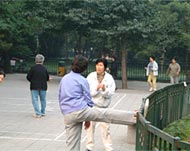China rapidly expanding – sideways
Shi Lidong is a busy man. Running the Tianjin branch of the Aimin Weight Reduction hospital, he oversees up to six hundred patients a day who pass through his doors in the hope of shedding a couple of kilograms.

Using acupuncture, the hospital has treated 46,000 patients since first opening in 1992, and Shi sees no letting up in future demand.
“I think the modern Chinese lifestyle is not conducive to staying slim,” he says. “Now that we use cars, computers and elevators there are less opportunities for exercise.”
Recent statistical data from the health ministry appears to support his hypothesis.
Released in mid-October, figures show that while China is winning its age long battle against malnutrition, it now faces a new foe in the form of expanding waistlines.
|
About 60 million people or 7.1% of the adult population are clinically obese while 200 million or 22.1% are overweight |
With surveys conducted in almost 72,000 households, an estimated 60 million or 7.1% of the adult population weighed in as being clinically obese, a 97% increase since the last national survey in 1992.
An additional 200 million or 22.1% of the adult population are considered overweight.
This compares with 65% of the US adult population who are considered either overweight or obese.
Battling the bulge
Fighting this battle of the bulge, however, will be only one part of an evolving role for the nation’s doctors.
As economic development moves society towards a more sedate lifestyle with increased hours at the desk and fewer spent burning off excess calories, experts expect to see in the future higher rates of chronic non-infectious diseases such as hypertension, diabetes and cancers.
 |
|
Part of the blame has been put |
“What we are seeing is an increase in diseases of affluence,” believes Chen Junshi, an adviser on food nutrition at the China Centre for Disease Control (CDC).
According to the report, which was compiled between August and December in 2002, the prevalence of hypertension (abnormally high blood pressure) has increased by 31% since 1992 and now accounts for 18.8% of the adult population, or 160 million people.
While it is tempting to blame the rapidly expanding fast food sector, which includes usual suspects KFC and McDonald’s, (who recently announced plans to begin franchising their stores), simply closing the nation’s burger bars will not solve the problem.
Lifestyle changes
“We are talking about the need for a lifestyle shift,” said Ding Songyi, president of the Chinese Committee of Child Health. “I call it the five step guide: Eat, drink, physical activity, happiness and sleep. Eat a balanced diet, drink plain water, exercise more, be happy and sleep longer.”
In a pattern familiar elsewhere around the world, the dispelling of wearisome yet ultimately rational advice confirms that there is no quick fix to culinary over exuberance.
In his own research though, Ding found added reason to heed the doctors warning.
|
Figure conscious pyromaniacs would wrap themselves in an alcohol soaked towel and then strike a match, apparently in the belief this would ‘burn away the fat’ Fire Dragon Beauty Therapy, one of China’s dietary wonders |
Studying the eating habits of children, he recorded rates of obesity as high as 15% among 6-15-year-olds, double the national rate for adults, although he did admit that his criteria for being obese were unforgiving.
Pointing to the reasons why, it appears that the unique conditions of the China’s one child policy may be partly to blame.
“The main reason is the parent’s emotional factor,” Ding says, referring to parents over pampering their ‘little emperors’. And if unable to coax either of their parents into buying that chocolate ice cream, one can always turn to a doting grandparent.
Over nourishment is only one part though, as a highly competitive university placement system ensures that children spend much of their adolescence studying, even on weekends, when instead of playing outside they get sent to English school.
“There is an over encouragement of study and not enough encouragement of exercise,” concludes Ding.
Prevention
Although picking up the bad dietary habits of the West, China is currently in a position to take preventive measures before there is any talk of an epidemic.
 |
|
Less exercise means more cases |
Yet to witness a popular national health craze akin to the Atkins Diet that is currently in vogue in the United States, China has its fair share of dietary wonders.
One recent headliner was the Fire Dragon Beauty Therapy in which figure conscious pyromaniacs would wrap themselves in an alcohol soaked towel and then strike a match, apparently in the belief this would ‘burn away the fat’.
Or one could sign up for a course at Shi Lidong’s hospital where the record so far for weight reduction was the loss of 175kg in only 14 months.
“We will consolidate our work to improve people’s nutrition status and the control and prevention of chronic diseases through policy support, market guidance and public education,” said Kong Lingzhi, director of the health ministry, when announcing the report.
Education and legislation
Publishing wider guidelines on healthy nutrition and dietary habits, a greater stress on exercise in schools, and legislation to curb misleading food product labels – which sometimes boast of having life preserving properties – are some of the ideas being touted.
|
“We are talking about the need for a lifestyle shift… Eat a balanced diet, drink plain water, exercise more, be happy and sleep longer” Ding Songyi, Chinese Committee of Child Health president |
“The immediate action should be education,” believes Chen Junshi of China’s CDC. “Most people don’t even know what a healthy diet is.”
According to the report, the population awareness rate for hypertension was only 30.2%, with just 24.7% of those sufferers receiving appropriate treatment.
An unhealthily high consumption of oils and meats due to limited education was also cited.
The concern for Chen Junshi though, is that with contagious diseases dominating the headlines, dietary patterns will not get a good look.
“HIV, Hepatitis, Sars – there are so many health issues that require education that diet and nutrition remains a very minor topic.”
Unless it becomes a major topic soon, it may become a major problem.